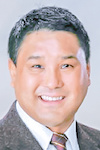
Judd Matsunaga
Throughout human history, ancient cultures venerated the act of creating sounds and strongly believed that specific resonant frequencies can produce healing effects. Ancient mythologies looked at sound not merely as pleasurable entertainment but also as a healing and therapeutically energetic force.
Though we can’t see it, everything in the material world vibrates at a frequency. Sound is vibration in space and time. Musicians tune their instruments to a specific pitch in order to literally be “in tune” with each other. We’ve all seen the opera singer shatter a glass by singing a note at the exact pitch that resonates with the glass.
The idea that targeted frequencies can have a resonant effect on us, physically and psychologically, is not as outlandish as it may first sound.
I grew up on the original “Star Trek” (the ones with George Takei playing Sulu, helmsman of the starship USS Enterprise). Every episode had Dr. McCoy waving an electrical device that made a sound pitch over someone’s body to heal it.

Music is so powerful that it can produce healing effects and boost happiness.
Evidently, microscopically, cells emit sounds, as if they’re singing to its neighbors. “By using an atomic force microscope to listen to the specific sound that a cell emits, we can identify its unique sonic signature,” says Dr. James Gimzewski of UCLA. This research, called “sonocytology,” finds unhealthy cells through their sonic signatures and then plays their own destructive sounds back to them until they are destroyed through the law of resonance.
The use of sound as opposed to chemotherapy and more invasive surgery would truly be a paradigm shift in cancer treatment. Dr. Anthony Holland, in his TEDx talk called “Shattering Cancer With Resonant Frequencies,” said, “I believe the future of children’s cancer hospitals will be a different place. They will be a place where children gather and make new friends, they probably won’t even know they are sick. They’ll draw pictures, color in their books and play with their toys, all the while unaware that above them a beautiful blue plasma light is emanating healing, pulsing fields shattering their cancer painlessly, and nontoxically, one cell at a time.”
“But Judd, that’s too far into the future. Can music help me now?” YES. Listening to music can also be considered an exercise for the mind. Music is actually one of the most powerful stimulants to the brain, and when you’re listening to music, your brain is highly engaged in the sound. If you play instruments, even better! You’re exercising not only the brain but also the body.
Music is even more important if you want to prevent premature aging of the brain. Many people think they only need to worry about memory once they’re older, but because of their habits and diets, they might start noticing memory problems way too soon. Listening to music can help prevent memory problems and improve your hearing.
Dr. Masaru Emoto, a Japanese scientist and author of the best-selling book “The Hidden Messages in Water” discovered that water can be encoded with vibrational information. Dr. Emoto pointed out that the human body is mainly water, and apparently, water loves beautiful, harmonious frequencies.
In one of his studies, called the “Wisdom of Water,” it demonstrated how different types of sound produce different crystalline patterns in water. When exposed to Mozart’s “Symphony No. 40,” distilled water samples produced ornate and geometrically symmetrical crystals. On the other hand, distilled water that had been exposed to heavy metal music produced distorted formations.
“I believe that music was created to bring our vibration back to its intrinsic state. It’s human nature to create music that readjusts the vibrations distorted by history. That’s why I’m so certain that music is a form of healing before it is an art,” he said. “It can become a matter of life and death if we allow our ‘life force’ to become compromised by the chaotic noise and toxicity of the modern world.”
Another 2018 study from Japan concluded that music played at certain frequencies may carry spiritual or healing benefits for their listeners. Music is so powerful, and doing something as simple as listening to it can boost your memory and prevent years of struggle. As a bonus, singing along to your favorite artists can also drastically improve brain function.
You can also use music to reduce stress! Stress is one of the main causes of memory loss. When people are stressed and frustrated, they tend to have difficulty creating short-term memories, which will then damage the ability to create long-term memories. Just like music helps reduce stress levels, it can also improve your mood.
However, it is not just any song! A happy tune can immediately bring you out of a somber mood and brighten your mind. Some songs can stimulate the brain and make you more alert, which will improve your attention span and focus while learning new information.
You can even find specific playlists to improve mood in most streaming services, so it’s worth checking it out whenever you notice that you require an energy boost. Having a “Happy” playlist in a lower volume while doing something related to memory can also bring positive results. Happy songs can drastically improve your mood, reduce stress and enhance alertness.
In conclusion, scientific research has discovered that five songs in particular, across a number of genres, have been shown to trigger dopamine release and subsequently increase your happiness. Here are the five songs (source: www.inc.com, “Science Says Listening to These 5 Songs Will Make You Remarkably Happy,” Jan. 5, 2017):
“Clair de Lune” by Debussy
“Adagio for Strings” by Barber
“Piano Sonata No. 17 in D Minor” (“The Tempest”) by Beethoven
“First Breath After Coma” by Explosions in the Sky
“Adagio for Strings” by Tiesto.
Judd Matsunaga is the founding attorney of Elder Law Services of California, a law firm that specializes in Medi-Cal Planning, Estate Planning and Probate. He can be contacted at (310) 348-2995 or judd@elderlawcalifornia.com. The opinions expressed in this article are the author’s own and do not necessarily reflect the view of the Pacific Citizen or constitute legal or tax advice and should not be treated as such.



